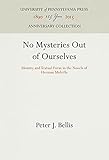No Mysteries Out of Ourselves : Identity and Textual Form in the Novels of Herman Melville / Peter J. Bellis.
Material type: TextSeries: Anniversary CollectionPublisher: Philadelphia : University of Pennsylvania Press, [1990]Copyright date: ©1990Description: 1 online resource (232 p.)Content type:
TextSeries: Anniversary CollectionPublisher: Philadelphia : University of Pennsylvania Press, [1990]Copyright date: ©1990Description: 1 online resource (232 p.)Content type: - 9780812282290
- 9781512800593
- online - DeGruyter
- Issued also in print.
| Item type | Current library | Call number | URL | Status | Notes | Barcode | |
|---|---|---|---|---|---|---|---|
 eBook
eBook
|
Biblioteca "Angelicum" Pont. Univ. S.Tommaso d'Aquino Nuvola online | online - DeGruyter (Browse shelf(Opens below)) | Online access | Not for loan (Accesso limitato) | Accesso per gli utenti autorizzati / Access for authorized users | (dgr)9781512800593 |
Frontmatter -- Contents -- Acknowledgments -- I. Introduction -- II. Bodily Identity: The Changing Shape of the Physical Self -- III. Genealogical Identity: Filial Repetition and Rebellion -- IV. Textual Identity: Autobiography and the Fiction of Self-Creation -- V. In Confidence: Identity as Interpretive Construction -- Notes -- Index
restricted access online access with authorization star
http://purl.org/coar/access_right/c_16ec
In this book Peter J. Bellis aims to show how Melville's career is shaped by his desire to define and represent the self, to find a secure identity on which to base personal and social relations. Using Typee, Pierre, White-Jacket, Redburn, Billy Budd, and Moby-Dick as models, Bellis isolates three forms of selfhood—the integrity of the physical body, the son's genealogical link to his father, and the coherence of an autobiographical text—that Melville explores throughout his work. He shows how, as Melville texts each of these, his work becomes increasingly self-reflexive and self-critical; his search for an absolute ground for both self and text ends by undermining the very authority it would establish. In this Melville differed markedly from Whitman and Thoreau, who did find or create identities for themselves in their writing.Bellis examines Melville's last novel, The Confidence-Man, to show his method as ultimately deconstructive—culminating, in fact, in the abandonment of Melville's own career as a novelist.
Issued also in print.
Mode of access: Internet via World Wide Web.
In English.
Description based on online resource; title from PDF title page (publisher's Web site, viewed 04. Okt 2022)


